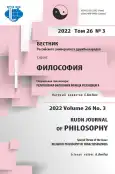К. Поппер и проблема эссенциализма в философии
- Авторы: Антонов А.В.1,2
-
Учреждения:
- Пермский национальный исследовательский политехнический университет
- Российский университет дружбы народов
- Выпуск: Том 26, № 3 (2022): РЕЛИГИОЗНАЯ ФИЛОСОФИЯ ФРАНЦА РОЗЕНЦВЕЙГА
- Страницы: 672-686
- Раздел: ФИЛОСОФИЯ НАУКИ
- URL: https://journal-vniispk.ru/2313-2302/article/view/325316
- DOI: https://doi.org/10.22363/2313-2302-2022-26-3-672-686
- ID: 325316
Цитировать
Полный текст
Аннотация
В современной философии эссенциализм в большинстве случаев рассматривается как отсталое и, по сути, неверное философское направление. И одним из ученых, создавших ему такую репутацию был известный английский философ австрийского происхождения Карл Поппер. Успех его книги «Открытое общество и его враги» привел к тому, что, фактически, эссенциализм не только стал считаться на Западе несостоятельным когнитивно, но и подозрительным как теоретическая основа фашизма, коммунизма и тоталитаризма. В статье доводы К. Поппера против эссенциализма рассмотрены заново, и показано, что критика К. Поппером эссенциализма как антинаучной и устаревшей доктрины - это не точка зрения всей философии, а всего лишь позиция эмпирического в своей основе позитивизма. Эссенциализм имеет дело с реальностью, которая лежит по ту сторону явлений. И это, по мнению К. Поппера, необходимо ведет к «окончательным» определениям. Однако в соответствии с учением о фальсификации самого К. Поппера, всякий научный вывод в пределах своего срока годности является «окончательным». В статье показано, что в действительности эссенциализм не только играл чрезвычайную роль в классической метафизической теории познания, но и продолжает это делать в рамках современной онтологии. Причем в последнем случае он делает это с помощью абдукции - специфической формы логического вывода, порождающей научные гипотезы. Существование же в науке абдукции, порождающей новое знание, говорит о том, что эссенциализм - это не нечто, в лучшем случае, терпимое и извинительное. Это - магистральный путь развития наук вообще. Во всех случаях автор статьи рассматривает только логические сущности, а не юридические, теологические или какие бы то ни было еще.
Ключевые слова
Об авторах
Алексей В. Антонов
Пермский национальный исследовательский политехнический университет; Российский университет дружбы народов
Автор, ответственный за переписку.
Email: akvizit@yandex.ru
ORCID iD: 0000-0002-6909-8902
кандидат философских наук, доцент, Пермский национальный исследовательский политехнический университет; докторант кафедры социальной философии, Российский университет дружбы народов
Российская Федерация, 614990, Пермь, Комсомольский проспект, д. 29; Российская Федерация, 117198, Москва, ул. Миклухо-Маклая, д. 6Список литературы
- Popper KR. The Open Society and its Enemies. Princeton and Oxford: Princeton University Press; 2013.
- Popper KR. The Logic of Scientific Discovery. London and New York: Taylor & Francis e-Library; 2005.
- Carnap R. Überwindung der Metaphysik durch logische Analyse der Sprache. Erkenntnis. 1931;2(1):219-241. https://doi.org/10.1007/bf02028153
- Blaug M. The methodology of economics or how Economists explain. New York: Cambridge University Press; 2006.
- Przhilenskij VI. Sotsial'no-istoricheskij kontekst stanovlenija analitiki prisutstvija [Socio-historical Context of the Formation of Presence Analytics]. Izvestija vuzov. Severo-Kavkazskij region. Obshchestvennye nauki. 2010;(4):137-140. (In Russian).
- Popper KR. Conjectures and Refutations. The Growth of Scientific Knowledge. New York and London: Basic Books; 1962.
- Popper KR. The Poverty of Historicism. Frome and London: The Beacon Press; 1957.
- Hegel GWF. Encyclopedia of the Philosophical Sciences in Basic Outline. Part I: Science of Logic. New York: Cambridge University Press; 2010.
- Antonov AV. Osnovanie sociologii. Ch. I. Chelovek smyshl’onyj, ili O proishozhdenii logicheskogo myshlenija i soznanija [The Foundation of Sociology. Part I. An Intelligent Person, or About the Origin of Logical Thinking and Consciousness]. Perm’: Izdatel’stvo Permskogo nacional’nogo issledovatel'skogo politehnicheskogo universiteta; 2012. (In Russian).
- Kovalenok AA. Ontologija Platona i Plotina: shodstva i razlichija [The Ontology of Plato and Plotinus: Similarities and Differences]. Vestnik Nizhegorodskogo universiteta im. N.I. Lobachevskogo. Serija Sotsial'nye nauki. 2008;4(12):110-116. (In Russian).
- Budenkova VE. Dva sposoba postroenija ontologii i perspektivy neklassicheskoj epistemologii [Two ways of constructing ontology and perspectives of non-classical epistemology]. Vestnik Tomskogo gosudarstvennogo universiteta. 2007;(298):66-71. (In Russian).
- Bhaskar R., Callinicos A. Marxism and critical Realism. A Debate. Journal of Critical Realism. 2003;1(2):89-114. https://doi.org/10.1558/jocr.v1i2.89
- Pasnau R. Theories of cognition in the later Middle Ages. Cambridge: Cambridge University Press; 1997.
- Chikovani S. Stihotvorenija i poemy [Verses and Poems]. Leningrad: Sovetskij pisatel’. Leningradskoe otdelenie; 1983. (In Russian).
- Putnam H. Words and Life. Conant J, editor. Cambridge, Massachusetts, London: Harvard University Press; 1995.
- Peirce Ch. The Nature of Meaning. In: The essential Peirce: Selected philosophical writings. Vol. 2. Bloomington and Indianapolis: Indiana University Press; 1998. p. 208-225.
- Walton D. Abductive Reasoning. Tuscaloosa: University of Alabama Press; 2005.
- Gelman S., Markman E. Categories and induction in young children. Cognition. 1986;(23):183-209. https://doi.org/10.1016/0010-0277(86)90034-x
- Arvanitis A. Essentialization as a Distinct Form of Abductive Reasoning. Journal of Theoretical and Philosophical Psychology. 2014;34(4):243-256. https://doi.org/10.1037/a0036182
- Peirce Ch. On the Logic of Drawing History from Ancient Documents, Especially from Testimonies. In: The essential Peirce: Selected philosophical writings. Vol. 2. Bloomington and Indianapolis: Indiana University Press; 1998. p. 75-114.
- Hintikka J. What is Abduction? The Fundamental Problem of Contemporary Epistemology. Transactions of the Charles S. Peirce Society. 1998;34(3):503-533. https://doi.org/10.2307/40320712
- Berkeley G. Analitik, ili Rassuzhdenie, adresovannoe neverujushchemu matematiku, gde issleduetsja, javljaetsja li predmet, printsipy i zakljuchenija sovremennogo analiza bolee otchetlivo poznavaemymi i s ochevidnostju vyvodimymi, chem religioznye tainstva i polozhenija very [An Analyst, or a Reasoning addressed to an unbeliever mathematician, where it is investigated whether the subject, principles and conclusions of modern analysis are more clearly cognizable and clearly deducible than religious sacraments and positions of faith]. In: Berkeley G. Sochinenija [Essays]. Moscow: Mysl’ publ.: 1978. p. 149-248 (In Russian).
- Bruner J., Postman L. Tension and tension release as organizing factors in perception. Journal of Personality. 1947;15(4):300-308. https://doi.org/10.1111/j.1467-6494.1947.tb01070.x
- Bruner J. Psihologija poznanija. Za predelami neposredstvennoj informacii [Psychology of cognition. Beyond the immediate information]. Moscow: Progress publ.: 1977. (In Russian).
- Peirce Ch. Pragmatism as the logic of Abduction. In: The Essential Peirce: Selected Philosophical Writings. Vol. 2. Bloomington and Indianapolis: Indiana University Press; 1998. p. 226-241.
- Khawaja I. Essentialism, Consistency and Islam: A Critique of Edward Said’s Orientalism. Israel Affairs. 2007;13(4):689-713. https://doi.org/10.1080/13537120701444961
Дополнительные файлы









